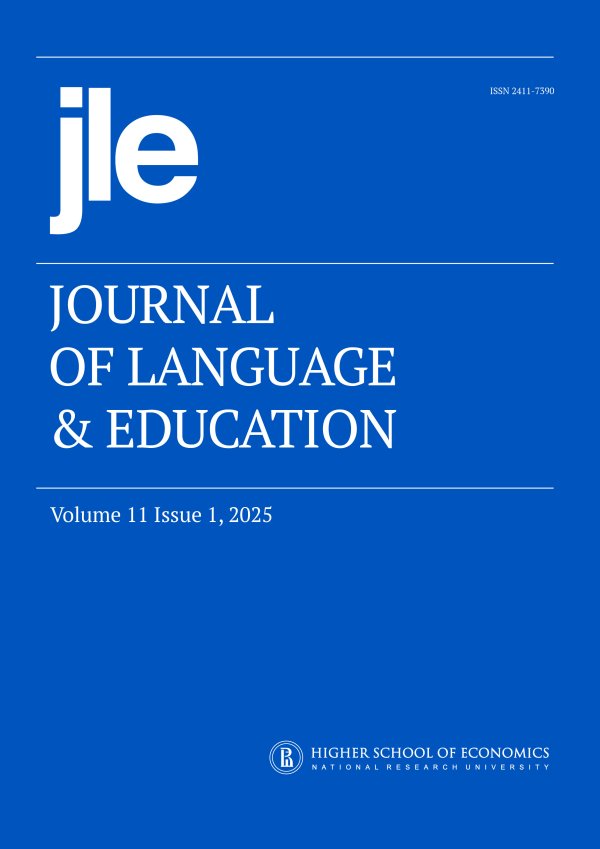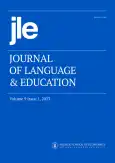Preferences for Oral Corrective Feedback: Are Language Proficiency, First Language, Foreign Language Classroom Anxiety, and Enjoyment Involved?
- Авторы: Wiboolyasarin W.1, Tiranant P.2, Khumsat T.3, Ngamnikorn T.4, Wiboolyasarin K.5, Korbuakaew S.6, Jinowat N.7
-
Учреждения:
- Research Institute for Languages and Cultures of Asia, Mahidol University, Nakhon Pathom, Thailand
- The University of Hong Kong, Hong Kong
- Nanjing Tech University Pujiang Institute, Nanjing, People's Republic of China
- Busan University of Foreign Studies, Busan, Republic of Korea
- Chandrakasem Rajabhat University, Bangkok, Thailand
- Demonstration School of Suan Sunandha Rajabhat University, Bangkok, Thailand
- Suan Sunandha Rajabhat University, Bangkok, Thailand
- Выпуск: Том 9, № 1 (2023)
- Страницы: 172-184
- Раздел: Оригинальное исследование
- URL: https://journal-vniispk.ru/2411-7390/article/view/301903
- DOI: https://doi.org/10.17323/jle.2023.16141
- ID: 301903
Цитировать
Полный текст
Аннотация
Background. The effectiveness of oral corrective feedback (OCF) in language learning is influenced by learners' comprehension and response to various OCF techniques. Therefore, it is essential for teachers to consider learners' preferences for OCF strategies.
Purpose. This quantitative study aimed to investigate the preferences of Thai as a foreign language (TFL) learners for ten commonly discussed types of OCF. Specifically, it examined whether these preferences are influenced by four learner variables: proficiency level, first language (L1), foreign language classroom anxiety (FLCA), and foreign language enjoyment (FLE).
Methods. The study involved 288 university students from Chinese, Japanese, and Korean TFL settings, and the data from questionnaires were analysed using appropriate statistical methods.
Results. The findings indicate that, regardless of proficiency level, L1, FLCA, or FLE level, learners prefer more explicit OCF techniques, such as metalinguistics feedback and explicit correction. However, Korean undergraduates scored lower in the majority of OCF strategies (i.e., ignoring, elicitation, recast, explanation, and public feedback) compared to the other participants. The MANOVA analysis revealed significant differences in ignore, peer correction, recast, and private feedback based on proficiency level and L1 background. Although the differences between the FLE and FLCA approaches were not statistically significant, high FLE and FLCA groups tended to prefer more OCF strategies than the low groups.
Conclusion. This study has significant implications for instructional practices in TFL settings and for L2 lecturers in the classroom. By understanding learners' preferences for OCF, educators can tailor their instructional approaches to meet the specific needs of their students.
Ключевые слова
Об авторах
W. Wiboolyasarin
Research Institute for Languages and Cultures of Asia, Mahidol University, Nakhon Pathom, Thailand
Автор, ответственный за переписку.
Email: nattawut.ji@ssru.ac.th
P. Tiranant
The University of Hong Kong, Hong Kong
Email: nattawut.ji@ssru.ac.th
T. Khumsat
Nanjing Tech University Pujiang Institute, Nanjing, People's Republic of China
Email: nattawut.ji@ssru.ac.th
T. Ngamnikorn
Busan University of Foreign Studies, Busan, Republic of Korea
Email: nattawut.ji@ssru.ac.th
K. Wiboolyasarin
Chandrakasem Rajabhat University, Bangkok, Thailand
Email: nattawut.ji@ssru.ac.th
S. Korbuakaew
Demonstration School of Suan Sunandha Rajabhat University, Bangkok, Thailand
Email: nattawut.ji@ssru.ac.th
N. Jinowat
Suan Sunandha Rajabhat University, Bangkok, Thailand
Email: nattawut.ji@ssru.ac.th
Список литературы
- Adigun, O. T. (2021). Inclusive education among pre-service teachers from Nigeria and South Africa: A comparative cross-sectional study. Cogent Education, 8(1), 1-19. DOI: https://doi.org/10.1080/2331186X.2021.1930491
- Bada, E., & Okan, Z. (2000). Students' language learning preferences. The Electronic Journal for English as a Second Language, 4(3), 1-15.
- Carless, D. (2006). Differing perceptions in the feedback process. Studies in Higher Education, 31(2), 219-233. DOI: https://doi.org/10.1080/03075070600572132
- Cohen, L., Manion, L., & Morrison, K. (2018). Research methods in education (8th ed.). Routledge.
- Deptolla, A. (2019). Language-learner preferences for corrective feedback (Publication No. 13812139) [Master's thesis, University of Colorado at Boulder]. ProQuest Dissertations and These Global.
- Dewaele, J.-M. (2017). Psychological dimensions and foreign language anxiety. In S. Loewen, & M. Sato (Eds.), The Routledge handbook of instructed second language acquisition (pp. 433-450). Routledge.
- Dewaele, J.-M., & Dewaele, L. (2020). Are foreign language learners' enjoyment and anxiety specific to the teacher? An investigation into the dynamics of learners' classroom emotions. Studies in Second Language Learning and Teaching, 10(1), 45-65. DOI: https://doi.org/10.14746/ssllt.2020.10.1.3
- Dewaele, J.-M., & MacIntyre, P. D. (2014). The two faces of Janus? Anxiety and enjoyment in the foreign language classroom. Studies in Second Language Learning and Teaching, 4(2), 237-274. DOI: https://doi.org/10.14746/ssllt.2014.4.2.5
- Ellis, R. (2009). Corrective feedback and teacher development. L2 Journal, 1(1), 3-18. DOI: https://doi.org/10.5070/l2.v1i1.9054
- Ellis, R., & Shintani, N. (2014). Exploring language pedagogy through second language acquisition research. Routledge.
- Fidan, D. (2015). Learners' preferences of oral corrective feedback: An example of Turkish as a foreign language learners. Educational Research and Reviews, 10(9), 1311-1317. DOI: https://doi.org/10.5897/ERR2015.2162
- Geçkin, V. (2020). Do gender differences affect foreign language anxiety and preferences for oral corrective feedback? Journal of Theoretical Educational Science, 13(3), 591-608. DOI: https://doi.org/10.30831/akukeg.64744
- George, D., & Mallery, P. (2016). IBM SPSS statistics 23 step by step: A simple guide and reference (14th ed.). Routledge.
- Gómez Argüelles, L., Hernández Méndez, E., & Perales Escudero, M. D. (2019). EFL teachers' attitudes towards oral corrective feedback: A case study. PROFILE: Issues in Teachers' Professional Development, 21(1), 107-120. DOI: https://doi.org/10.15446/profile.v21n1.69508
- Gooch, R., Saito, K., & Lyster, R. (2016). Effects of recasts and prompts on L2 pronunciation development: Teaching English /ɹ/ to Korean adult EFL learners. System, 60, 117-127. DOI: https://doi.org/10.1016/j.system.2016.06.007
- Ha, X. V., & Nguyen, L. T. (2021). Targets and sources of oral corrective feedback in English as a foreign language classrooms: Are students' and teachers' Beliefs aligned? Frontiers in Psychology, 12, 1-10. DOI: https://doi.org/10.3389/fpsyg.2021.697160
- Horwitz, E. K. (2010). Foreign and second language anxiety. Language Teaching, 43, 154-167. DOI: https://doi.org/10.1017/S026144480999036X
- Horwitz, E. K. (2017). On the misreading of Horwitz, Horwitz, and Cope (1986) and the need to balance anxiety research and the experiences of anxious language learners. In C. Gkonou, M. Daubney, & J.-M. Dewaele (Eds.), New insights into language anxiety: Theory, research and educational implications (pp. 31-47). Multilingual Matters.
- Horwitz, E. K., Horwitz, M. B., & Cope, J. (1986). Foreign language classroom anxiety. Modern Language Journal, 70, 125-132. DOI: https://doi.org/10.1111/j.1540-4781
- Huberty, C. J, & Petoskey, M. D. (2000). Multivariate analysis of variance and covariance. In H. E. A. Tinsley, & S. D. Brown (Eds.), Handbook of applied multivariate statistics and mathematical modeling (pp. 183-208). Academic Press. DOI: https://doi.org/10.1016/B978-012691360-6/50008-2
- Kartchava, E., & Ammar, A. (2014). Learners' beliefs as mediators of what is noticed and learned in the language classroom TESOL Quarterly, 48(1), 86-109. DOI: https://doi.org/10.1002/tesq.101
- Lee, E. J. (2013). Corrective feedback preferences and learner repair among advanced ESL students. System, 41(2), 217-230. DOI: https://doi.org/10.1016/j.system.2013.01.022
- Lee, I. (2017). Classroom assessment and feedback in L2 school contexts. Springer. DOI: https://doi.org/10.1017/S0261444819000247
- Li, S. (2018). Corrective feedback in L2 speech production. In J. Liontas (Ed.), The TESOL encyclopedia of English language teaching (pp. 1-9). John Wiley & Sons.
- Li, S. (2021). Oral corrective feedback. In H. Mohebbi, & C. Coombe (Eds.), Research questions in language education and applied linguistics: A reference guide (pp. 353-357). Springer. DOI: https://doi.org/10.1007/978-3-030-79143-8_63
- Lyster, R. (2004). Differential effects of prompts and recasts in form-focused instruction. Studies in Second Language Acquisition, 26(3), 399-432. DOI: https://doi.org/10.1017/S0272263104263021
- Lyster, R., & Saito, K. (2010). Oral feedback in classroom SLA: A meta-analysis. Studies in Second Language Acquisition, 32(2), 265-302. DOI: https://doi.org/10.1017/S0272263109990520
- Lyster, R., Saito, K., & Sato, M. (2013). Oral corrective feedback in second language classrooms Language Teaching, 46(1), 1-40. DOI: https://doi.org/10.1017/S0261444812000365
- MacIntyre, P. D., & Gregersen, T. (2012). Emotions that facilitate language learning: The positive-broadening power of the imagination. Studies in Second Language Learning and Teaching, 2, 193-213. DOI: https://doi.org/10.14746/ssllt.2012.2.2.4
- Martínez Agudo, J. D. (2013). An investigation into how EFL learners emotionally respond to teachers' oral corrective feedback. Colombian Applied Linguistics Journal, 15(2), 265-278.
- Muslem, A., Zulfikar, T., Astilla, I., Heriansyah, H., & Marhaban, S. (2021). Students' perception toward oral corrective feedback in speaking classes: A case at English education department students.International Journal of Language Education, 5(4), 244-259. DOI: https://doi.org/10.26858/ijole.v5i4.19010
- Nassaji, H. (2016). Anniversary article interactional feedback in second language teaching and learning: A synthesis and analysis of current research. Language Teaching Research, 20(4), 535-562. DOI: https://doi.org/10.1177/1362168816644940
- Oflaz, A. (2019). The effects of anxiety, shyness and language learning strategies on speaking skills and academic achievement. European Journal of Educational Research, 8(4), 999-1011. DOI: https://doi.org/10.12973/eu-jer.8.4.999
- Papi, M., Wolff, D., Nakatsukasa, K., & Bellwoar, E. (2021). Motivational factors underlying learner preferences for corrective feedback: Language mindsets and achievement goals. Language Teaching Research, 25(6), 858-877. DOI: https://doi.org/10.1177/13621688211018808
- Rassaei, E. (2015). Oral corrective feedback, foreign language anxiety and L2 development. System, 49, 98-109. DOI: https://doi.org/10.1016/j.system.2015.01.002
- Rollinson, P. (2005). Using peer feedback in the ESL writing class. ELT Journal, 59(1), 23-30. DOI: https://doi.org/10.1093/elt/cci003
- Sakiroglu, H. Ü. (2020). Oral corrective feedback preferences of university students in English communication classes.International Journal of Research in Education and Science, 6(1), 172-178.
- Sepehrinia, S., Fallah, N., & Torfi, S. (2020). English language teachers' oral corrective preferences and practices across proficiency groups. PROFILE: Issues in Teachers' Professional Development, 22(2), 163-177. DOI: https://doi.org/10.15446/profile.v22n2.82369
- Tasdemir, M. S., & Yalcin Arslan, F. (2018). Feedback preferences of EFL learners with respect to their learning styles. Cogent Education, 5(1), 1-17. DOI: https://doi.org/10.1080/2331186X.2018.1481560
- Ur, P. (2012). A course in English language teaching (2nd ed.). Cambridge University Press.
- Wiboolyasarin, K., Kamonsawad, R., Jinowat, N., & Wiboolyasarin, W. (2022). EFL learners' preference for corrective feedback strategies in relation to their self-perceived levels of proficiency. English Language Teaching Educational Journal, 5(1), 32-47. DOI: https://doi.org/10.12928/eltej.v5i1.4403
- Wiboolyasarin, W., Wiboolyasarin, K., & Jinowat, N. (2020). Learners' oral corrective feedback perceptions and preferences in Thai as a foreign language tertiary setting. Journal of Language and Linguistic Studies, 16(2), 912-929. DOI: https://doi.org/10.17263/jlls.759344
- Yakisik, B. Y. (2021). EFL learners' preferences and emotions about oral corrective feedback at secondary education in Turkey: Are there gender and grade-level differences? Indonesian Journal of English Language Teaching and Applied Linguistics, 6(1), 103-122. DOI: https://doi.org/10.21093/ijeltal.v6i1.889
- Yang, J. (2016). Learners' oral corrective feedback preferences in relation to their cultural background, proficiency level and types of error. System, 61, 75-86. DOI: https://doi.org/10.1016/j.system.2016.08.004
- Yu, S. (2019). Learning from giving peer feedback on postgraduate theses: Voices from master's students in the Macau EFL context. Assessing Writing, 40, 42-52. DOI: https://doi.org/10.1016/j.asw.2019.03.004
- Zhu, Y., & Wang, B. (2019). Investigating English language learners' beliefs about oral corrective feedback at Chinese universities: A large-scale survey. Language Awareness, 28(2), 139-161. DOI: https://doi.org/10.1080/09658416.2019.1620755
- Preferences for Oral Corrective Feedback: Are Language Proficiency, First Language, Foreign Language Classroom Anxiety, and Enjoyment Involved.
- Preferences for Oral Corrective Feedback: Are Language Proficiency, First Language, Foreign Language Classroom Anxiety, and Enjoyment Involved.
Дополнительные файлы











